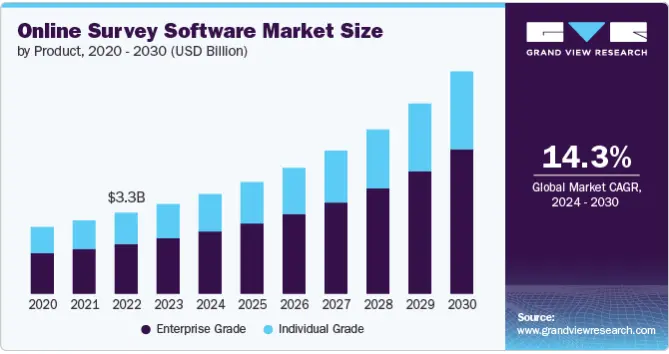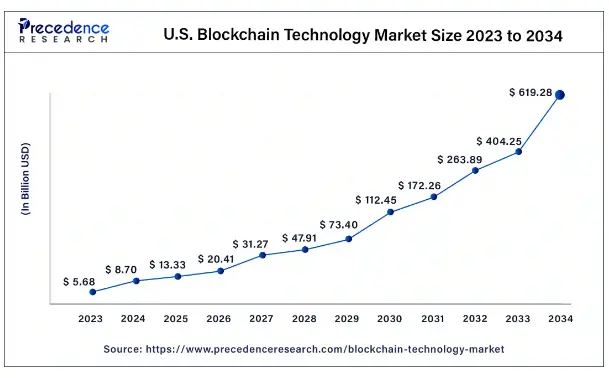Table of Contents
With the advent of disruptive technologies, surveys are also being revolutionized with the help of Blockchain technology for Surveys. Building a reliable, decentralized and immutable blockchain-based survey system can help address the challenges faced in traditional survey methods like fraud, tampering, lack of transparency etc.
Surveys play a crucial role in gathering useful data and insights to help organizations understand people’s opinions, behaviors, and preferences. However, traditional survey methods often lack transparency, have security issues, and are inefficient. This is where Blockchain technology for Surveys comes into play. A blockchain-based survey system provides a tamper-proof and transparent way to conduct surveys with higher participant engagement. This comprehensive guide discusses everything you need to know about developing a robust blockchain-based survey system including key benefits, features, challenges, and best practices.
Key Statistics:- Blockchain-Based Survey System
- The global survey software market was valued at $3.61 billion in 2023 and is expected to reach $6.19 billion by 2030, growing at a CAGR of 14.3% during the forecast period. Blockchain-based survey solutions have the potential to capture a significant market share.

- As per Persistence Market Research, the global blockchain survey software market is projected to grow at a CAGR of 52.9% between 2024-2034 to reach $1879 billion in value. Rising security and privacy concerns are major drivers of growth.

- North America dominates the blockchain survey software market currently due to the presence of major players and early technology adoption. However, Asia Pacific is expected to thrive at the fastest rate during the forecast period.
- According to a Cisco study, 80% of survey respondents feel blockchain could help make the survey process more reliable and trustworthy.
- Key sectors open to blockchain-based survey adoption include market research, healthcare, financial services, travel and hospitality, manufacturing etc. looking to gather secure, authentic feedback.
What is a Blockchain-Based Survey System?
A blockchain-based survey system utilizes distributed ledger technology to conduct surveys on a decentralized peer-to-peer network. In this system, participants register on the blockchain and their survey responses are recorded as encrypted entries on the blockchain. This creates a single, shared source of immutable survey data. Smart contracts automate survey workflows including response validation, reward distribution, and result tabulation. The survey results can be accessed in real-time by all stakeholders, ensuring transparency. By uniquely addressing the limitations of traditional survey methods, blockchain-based survey platforms are gaining popularity as the future of data collection.
A blockchain-based survey system refers to a decentralized, immutable and transparent platform for collecting survey responses leveraging the core characteristics of Blockchain technology for Surveys like distributed ledgers, cryptography, consensus and smart contracts. In such a system, users can participate in surveys anonymously and have their responses recorded on an append-only digital ledger in hashed/encrypted form.
Thus, blockchain revolutionizes surveys by providing a tamper-proof platform for transparent, private and automated data collection empowering both researchers and participants.
Benefits of Using Blockchain for Survey Systems
There are several benefits for organizations of using blockchain for Survey System to overcome limitations of paper/traditional digital surveys:
- Immutability: Once recorded, survey responses on the immutable blockchain ledger cannot be altered, ensuring response integrity.
- Transparency: Authorized stakeholders can access a tamper-proof record of all survey activities from creation to analysis on the distributed ledger in real-time.
- Security: Cryptography and decentralization improve security by distributing data across multiple nodes instead of a single database, reducing the risk of hacking or tampering.
- Anonymity: Participants can submit private, anonymous responses without revealing their identity with the help of cryptographic techniques like zero-knowledge proofs.
- Automation: Smart contracts automate complex multi-stage survey workflows like conditional question skipping, analysis, and distribution of rewards without human intervention.
- Incentivization: Systems enabling micropayments in tokens can boost participation by motivating respondents as against traditional paper tickets/coupons.
- Accuracy: Blockchain reduces scope of errors, cheating or duplicate responses by digitally authenticating each submission against the user’s public key.
- Cost Reduction: No costly third-party is required to manage or verify surveys lowering the overall cost of market research/feedback collection.
Thus, blockchain for Survey System enhances survey data collection by making it more secure, transparent, automated and incentivized for stakeholders.
Must-Add Features to Blockchain-Based Survey System Development
When developing a blockchain for Survey System solution, there are certain important features that need to be incorporated based on typical user and functionality requirements:
- Robust Registration/Onboarding: Intuitive participant registration ensuring KYC verifications and generation of unique digital identities/wallet addresses.
- Survey Creation: A simple interface for authorized users to easily design complex multi-conditional surveys with images, audio/video.
- Question Types: Support different question formats like multiple choice, rating scales, text, matrix, rank/priority etc.
- Target Groups: Implement filters to target specific demographics, behaviors for surveys.
- Incentive Model: Flexible incentive mechanisms like tokens for participation with cash-out options.
- Response Tracking: Track anonymous responses in real-time on distributed nodes for visibility and analytics.
- Analysis Suites: Leverage AI/ML for auto-analysis of textual submissions and visualize results.
- Reporting Dashboards: Insightful, customizable reports on key metrics like reach, engagement, NPS etc.
- Export Tools: Bulk export survey data in formats like CSV, JSON, PDF for external analysis.
- User Management: Role-based access control for admin, moderators, respondents on the network.
- Multi-lingual Support: Internationalization integrating global languages.
- Notifications: Push notifications driving response rates and timely reminders.
- Security: Robust identity authentication, data privacy, encryption for sensitive information.
Adopting these features ensures robust functionality meeting diversified user and business needs of blockchain-based survey platforms.
Key Challenges of Building a Blockchain-Based Survey System and How to Overcome
While blockchain-based Survey System offers clear advantages, certain challenges exist during development:
Scalability: Onboarding millions of users can clog the network. Solutions include state/payment channels, plasma side chains for off-chain data/txns.
Interoperability: Integrating legacy systems requires smart bridging tech like sidechains/pegs or decentralized oracles.
Regulation: Legal review is needed regarding data privacy, KYC norms for incentives on public chains.
Development: Building complex dApps with evolving tech needs requires an experienced dApp development company with skilled blockchain developers.
User-experience: UX design is critical for usability, on-boarding new users seamlessly.
Infrastructure: Maintaining throughput, redundancy across global nodes require robust cloud hosting.
Community: Early adoption depends on evangelizing value props to critical mass of users & researchers.
These challenges can be mitigated through expert Blockchain Development Services, careful architecture planning, establishing governance models and iterative product additions based on community feedback.
Best Practices for Developing a Blockchain-Based Survey System
- Conduct thorough research on requirements, scope, limitations of current systems through stakeholder interviews.
- Evaluate platforms like Ethereum, Corda, Hedera based on transaction volumes, features, support community.
- Design optimized data models and smart contracts code for intended scale on the selected platform.
- Implement modular, future-proof architecture with defined API layers and governance structures.
- Employ test-driven development and security audits by experts throughout the development life cycle.
- Gradually onboard real users by deploying minimum viable features initially on test networks.
- Monitor network performance during beta testing and optimize via immutable upgrades.
- Maintain comprehensive documentation for reference and encourage community participation.
- Establish standard SLA terms for any third-party Blockchain Development Services utilized.
- Continually improve based on changing needs through iterative deployment of enhancements.
Tech Stack Used in Blockchain-Based Survey Systems Development
- Blockchain Platform: Ethereum/Hyperledger Fabric/Corda for the decentralized peer-to-peer network
- Programming Languages: Solidity for smart contracts, Node.js/Golang for API development
- Web Development: React/Angular for frontend interfaces, Next.js for server-side rendering
- Database: IPFS for storing survey data off-chain, MongoDB Atlas for non-critical data
- Cloud Infrastructure: AWS/GCP for hosting nodes, storage, databases in a geographically redundant manner
- Testing Tools: Truffle/Ganache for contract unit testing, Kubernetes for integration/load testing
- Version Control: Git for tracking code changes, Github for code collaboration
- Security: Cryptography libraries for encryption, security audits by specialized firms
Blockchain-Based Survey System:- Future of Surveys
With evolving technologies, blockchain adoption is rising across industries by addressing current limitations. For surveys, Blockchain-Based Survey Solutions promise to transform the data collection landscape by incentivizing participation, enhancing transparency, and ensuring fully auditable results. This will lead to more accurate consumer insights, higher response rates, and validated research findings. Integrating emerging tools like machine learning can further augment these systems. As Blockchain-Based Survey Solutions gain popularity solving critical problems, we can expect them to become the norm for surveys in the near future.
How A3Logics Can Develop a Blockchain-Powered Survey Platform?
As a leading NFT marketplace development company, A3Logics has extensive experience developing complex decentralized applications. Our expert team of blockchain developers can craft highly scalable, secure and full-featured blockchain-based survey systems tailored to your requirements. We follow a rigorously tested agile methodology for rapid prototyping and deliver fully functional and production-ready DApps. Our proven track record, combined blockchain and web development expertise, and ability to offer end-to-end software services make us well-equipped to build robust blockchain-powered survey solutions. We also provide DApp maintenance and support services to ensure seamless operations.
Unlock the Power of Blockchain in Surveys – Book Your Free 30-Minute Consultation Today!
Final Take
Traditional survey methods are beset by limitations like lack of transparency, security vulnerabilities, inefficiencies and non-monetary incentives. Blockchain-Based Survey Solutions addresses these challenges by enabling the development of decentralized survey ledgers with immutable, auditable and real-time datasets. A blockchain-based survey system can transform the data collection landscape by optimizing processes, boosting participant engagement levels, and delivering thoroughly validated insights. By focusing on user needs, leveraging the right tech stack and addressing niche requirements, organizations can build powerful survey solutions on blockchain.
FAQ’s
How does a blockchain-based survey system maintain participant anonymity?
Blockchain-based survey systems utilize cryptography to anonymize response data at the point of submission. Private keys are used to identify respondents without exposing their real identity. Participants control what information is shared and what remains private through a permission layer.
What are the costs associated with developing a Blockchain-Based Survey Solutions?
Developing a production-ready blockchain-based survey system requires costs for blockchain platform fees, dedicated blockchain developers, quality assurance testing, documentation, cloud hosting infrastructure etc. The overall budget can range from $200,000 to over $1 million based on technical complexity and customization needs.
How does blockchain ensure transparency in survey systems?
All survey data and results on a blockchain ledger are equally visible and synchronized across participant nodes in near real-time through shared consensus. This allows stakeholders to verify processing integrity without centralized control, intermediaries or single points of failure vulnerabilities plaguing traditional systems.
What legal considerations should be taken into account?
Legal due diligence includes reviewing blockchain data protection laws, survey compliance regulations, digital advertising norms if incentivizing participation through tokens/crypto, and any restrictions on handling sensitive personal information while maintaining anonymity on distributed ledgers. Proper legal advice is essential.
How does Blockchain technology for Surveys Address the issue of data tampering?
Any attempt to retroactively alter survey responses recorded on a Blockchain-Based Survey Solutions would require computationally overwhelming efforts to modify the entire dataset on the distributed network of computers due to its immutability properties derived from cryptography. This protects against fraudulent submissions and response modifications.







